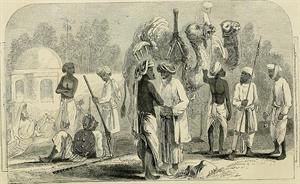PDF chapter test TRY NOW
Narrator: How did Indians react to these conquests? (People with varied opinions can be seen discussing the conquests of Britishers)
(Scene 5: Three royal men can be seen discussing inside a palace)
Royal man 1: Thank God, there is peace in the country now! No more wars and no looting by thugs!
Royal man 2: It is God who sent the British!
Royal man 3: Our destiny is linked with them!
(Scene 6: Four common people can be seen reacting to the conquest of Britishers)
Man 1: The white man has killed or dethroned our kings.
Man 2: Some kings were not good, but after all, they were of this land.
Man 3: Now we have become slaves of foreigners!
After the conquest or British rule in Indian territories, a few people were satisfied with their rule, and a few were against their conquest. The Indians had varied opinions and reactions about the British rule. The royal people brought the Britishers inside India so they were pleased with the Britishers and were also grateful because they thought that due to the arrival of Britishers they put an end to the enemies. The royal men felt the British rule put an end to the constant wars and struggles with their enemies. The royal people believed that God had sent them in the form of saviours, and their fate was connected with them.
On the other hand, the common people noticed the dishonest behaviour of the Britishers. They thought that the English man had arrived here for killing the kings or taking away the thrones from them. The Indians knew that even if some of the princes were unfit, they belonged to their country. They thought that the decision of the Indian princes turned them into slaves of the Britishers.

The common people were dissatisfied with the rule of Britishers
Meanings of the difficult words:
| S.No | Words | Meanings |
1 | Looting by thugs | To take goods from a place by force or without right, especially in time of war |
2 | Destiny | The hidden power believed to control future events; fate |
3 | Dethroned | Remove from a position of authority or dominance |
4 | Foreigner | A person born in or coming from a country other than one's own |
5 | Saviour | A person who saves someone or something from danger or difficulty |
Reference:
National Council of Educational Research and Training (2008). Honeydew. Glimpses of the Past-S.D.Sawant(pp. 36-49). Published at the Publication Division by the Secretary, National Council of Educational Research and Training, Sri Aurobindo Marg, New Delhi.
